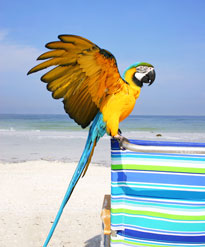
1.Ancient parrots. Most parrot fossils were excavated in Europe. The earliest dates back to the Eocene, and are 50 million years old. Most of the complete skeletons were found in Germany and England. These birds are considered the great “parrot ancestors.” However, fossils of modern parrots—with the same bone structure and appearance as the ones we see today, are about 23 million years old.
2.Two beautiful families. There are actually two major groups of parrots: the psittacidae, and the cacutaidae. The latter has a movable head crest while the psittacidae have brighter, more vibrant colors. There are also enormous skeletal differences. For example, the cacatuidae have a gall bladder and a different type of skull bone.
3.Parrots in danger. Some parrots are in danger of extinction. This includes the Spixs Macaw, of which only 7 survive in captivity. Naturalists once thought they had completely disappeared from the wild, but one was seen spotted flying in the South American rainforest. Breeding efforts have been stepped out to increase the parrots’ numbers.
4.Parrot owners unite! Most parrot conservation efforts are actually spearheaded by pet owners who love the birds and want to make sure they thrive. Efforts include fund raisers and information campaigns. Their projects have helped fund zoo and wild life centers, and have led to brochures and other important collaterals distributed to schools nationwide.
5.Jailed for smuggling parrots! Tony Silva, former director of Europe’s largest parrot park, was actually jailed for 82 months and fined over a hundred thousand dollars for smuggling Hyacinth macaws. Silva was a highly respected parrot expert. The case started an outcry for stricter parrot protection laws.
6.Parrots and poets. These colorful birds have been mentioned in ancient texts, magazines, and even Hollywood films. This includes movies like the comedy Paulie and documentaries like The Wild Parrots of Telegraph Hill.
7.White is right. Parrots come in almost every color of the rainbow, but the eggs are always a simple white.
8.Shout out! Parrots don’t have vocal cords, so they actually “trumpet” the sound by pushing air out of their trachea. They can control the pitch of the sound by manipulating the shape and depth of the trachea. Experts say that when parrots talk, they are actually making variations on whistling.
9.Eat meat. Most parrots will love seed and flowers, but there are some that don’t mind a little “steak”. The Golden-winged Parakeets like to eat water snails, while the New Zealand Kees even scavenge abandoned sheep carcasses.